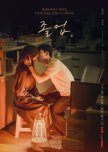Eye-opening but shot too dark to see
Is a teacher's purpose only for helping students pass exams? Not knowing what a hagwon is when I started this drama, I had homework to do. Why are school kids learning in an office building? isn't that setting usually for adult night classes? It took a few episodes just to get a sense of the role of hagwons, or private prep schools, within the public educational system. Teachers compete against each other for students while pandering to the parents, measuring success by how many get accepted to prestigious universities. It's a complex world of ultra-privilege & free market dynamics, intertwined with regular schooling like a cancer, choking out academic freedom & feuling incredible pressures for all involved.
Speaking of night classes, this drama made me claustrophobic. Most of the scenes are visually dark: offices & rooms appear windowless, what windows were visible had their blinds drawn during the day, many outdoor scenes were nighttime, & classrooms & offices are so small all the occupants looked like they were virtually shoulder to shoulder. It made for a very oppressive setting. In fact, the overall look was so dark I actually had to adjust the brightness of my tv just to see what was going on (it's a cheap tv).
In spite of the show being uncomfortable to look at, the story itself was fascinating as it introduced an aspect of S Korean society I hadn't seen before, nor have I experienced anything close to that where I live. The story follows Seo Hye Jin (played by Jung Ryeo Won) a top performing teacher at a Daechi-dong academy. Her life is turned upside down when her former star student, Lee Jun Ho (played by Wi Ha Joon) quits a comfortable, nepotically achieved corporate job & is hired as a new teacher into her own team.
When you've been teaching for while, you discover it takes a student to challenge you to your roots. HyeJin unknowingly instilled in JunHo genuine wonder & curiosity in literature which was the spark to the improvement in his grades. But having been in the business for so long, HyeJin seems to have forgotten that focus, locked into her memorization techniques & dependency on her ability to predict exam questions that brought her to the top of her game. In stark contrast is JunHo's approach in encouraging exploration & appreciation. Catalyzing their explosive clash is a brilliant 10th grade student Lee Si Wu, who is in the top tier of smart: i.e. he actually knows what he doesn't know. Si Wu fully understands his perfect scores are like walking blindfolded on a tightrope, totally dependent on knowing which questions to study for, rather than being able to handle any question that could come his way. He knows how to memorize, but doesn't know how to read. JunHo wants to teach students to read, a skill for a lifetime, which would bring a seismic shift to the role of the academy as an economic machine, catering only to parents' wishes.
The influence of hagwons is so deep they affect real estate, & this is reflected in Jun Ho's pursuit of becoming successful enough to buy his own home. In spite of growing up privileged in Gangnam, he's determined to achieve his own living & stay in Gangnam. Stronger than his own economic ambition, however, is his pursuit of the true purpose of education & his own role as a teacher.
At the center of it all is JunHo & HyeJin's noona relationship, one in which HyeJin has a very hard time overcoming the teacher/student mindset. And, given her own hesitancy & inexperience, she's paradoxically mature & immature at the same time. JunHo challenges her on different levels &, in this respect, I felt this was one of the more realistically presented age gap romances I've seen. Things get ugly when ambitious executives at the school seek to use this relationship to destroy HyeJin's career. This somehow made me lose interest in the show in it's final episodes as it plunged downward into viscious office politicking.
The subject of hagwons has been eye-opening & for that reason I enjoyed the story which is the show's greatest strength, along with good performances from the cast. Unfortunately, the show was also visually suffocating with all the poorly lit interior & night time settings, & with a lower res tv I sometimes couldn't even see the actors' faces clearly. If you can get beyond that, this drama was well worth the watch for an honest examination of the purpose of education itself.
Speaking of night classes, this drama made me claustrophobic. Most of the scenes are visually dark: offices & rooms appear windowless, what windows were visible had their blinds drawn during the day, many outdoor scenes were nighttime, & classrooms & offices are so small all the occupants looked like they were virtually shoulder to shoulder. It made for a very oppressive setting. In fact, the overall look was so dark I actually had to adjust the brightness of my tv just to see what was going on (it's a cheap tv).
In spite of the show being uncomfortable to look at, the story itself was fascinating as it introduced an aspect of S Korean society I hadn't seen before, nor have I experienced anything close to that where I live. The story follows Seo Hye Jin (played by Jung Ryeo Won) a top performing teacher at a Daechi-dong academy. Her life is turned upside down when her former star student, Lee Jun Ho (played by Wi Ha Joon) quits a comfortable, nepotically achieved corporate job & is hired as a new teacher into her own team.
When you've been teaching for while, you discover it takes a student to challenge you to your roots. HyeJin unknowingly instilled in JunHo genuine wonder & curiosity in literature which was the spark to the improvement in his grades. But having been in the business for so long, HyeJin seems to have forgotten that focus, locked into her memorization techniques & dependency on her ability to predict exam questions that brought her to the top of her game. In stark contrast is JunHo's approach in encouraging exploration & appreciation. Catalyzing their explosive clash is a brilliant 10th grade student Lee Si Wu, who is in the top tier of smart: i.e. he actually knows what he doesn't know. Si Wu fully understands his perfect scores are like walking blindfolded on a tightrope, totally dependent on knowing which questions to study for, rather than being able to handle any question that could come his way. He knows how to memorize, but doesn't know how to read. JunHo wants to teach students to read, a skill for a lifetime, which would bring a seismic shift to the role of the academy as an economic machine, catering only to parents' wishes.
The influence of hagwons is so deep they affect real estate, & this is reflected in Jun Ho's pursuit of becoming successful enough to buy his own home. In spite of growing up privileged in Gangnam, he's determined to achieve his own living & stay in Gangnam. Stronger than his own economic ambition, however, is his pursuit of the true purpose of education & his own role as a teacher.
At the center of it all is JunHo & HyeJin's noona relationship, one in which HyeJin has a very hard time overcoming the teacher/student mindset. And, given her own hesitancy & inexperience, she's paradoxically mature & immature at the same time. JunHo challenges her on different levels &, in this respect, I felt this was one of the more realistically presented age gap romances I've seen. Things get ugly when ambitious executives at the school seek to use this relationship to destroy HyeJin's career. This somehow made me lose interest in the show in it's final episodes as it plunged downward into viscious office politicking.
The subject of hagwons has been eye-opening & for that reason I enjoyed the story which is the show's greatest strength, along with good performances from the cast. Unfortunately, the show was also visually suffocating with all the poorly lit interior & night time settings, & with a lower res tv I sometimes couldn't even see the actors' faces clearly. If you can get beyond that, this drama was well worth the watch for an honest examination of the purpose of education itself.
Vond je deze recentie nuttig?





